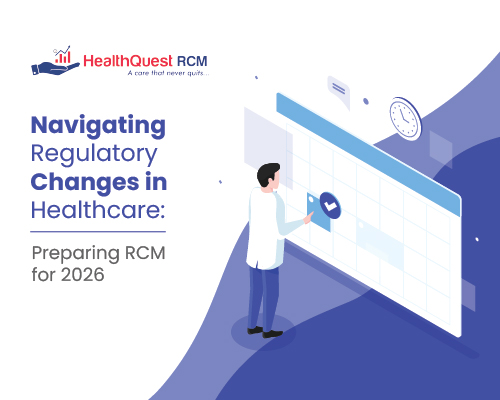As 2026 approaches, healthcare providers must prepare for a wave of regulatory changes that will directly impact billing, coding, compliance, and revenue cycle operations. From policy updates to stricter enforcement of value-based care models, the ability to adapt quickly will be critical for maintaining financial stability.
Revenue cycle leaders cannot afford to wait until the last minute. Preparing your RCM processes now will help you avoid disruptions, minimize compliance risks, and stay ahead of evolving payer expectations.
This guide explores key areas of regulatory change and offers practical steps to ensure your RCM team is ready for the future.
Understanding the Regulatory Landscape for 2026
The healthcare industry continues to evolve as federal and state governments roll out new rules focused on improving transparency, affordability, and patient outcomes. As part of this shift, providers are expected to comply with updated coding standards, payer regulations, and reporting requirements.
Some of the anticipated changes for 2026 include stricter claims documentation standards, enhanced reporting for quality metrics, updated payer contracts tied to outcomes, and increased use of AI-driven audits by payers. These changes are designed to reduce fraud and promote value-based care but will also place greater pressure on RCM teams to keep systems and processes aligned.
Update Coding and Billing Practices
One of the first steps to prepare for regulatory changes is to ensure your coding and billing teams are up to date with the latest guidelines. Regular training on ICD and CPT code updates is essential. As documentation standards evolve, coding accuracy will be under closer scrutiny.
In 2026, errors in documentation or incorrect coding could lead to more frequent denials and audits. Invest in tools that help coders stay compliant and consider partnering with an experienced RCM provider that stays ahead of regulatory updates.
Strengthen Compliance and Audit Readiness
Regulatory compliance will remain a top priority in the coming years. Healthcare organizations need to establish strong internal audit systems to catch issues early. This includes reviewing claim submissions for accuracy, checking that documentation matches coding, and ensuring all services are billed correctly.
Preparing for 2026 means adopting a proactive compliance culture. Build checklists, perform regular audits, and involve your compliance team in billing decisions. As payers begin using advanced technologies to identify anomalies in claims, you must ensure your internal controls are equally strong.
Embrace Value-Based Care and Quality Reporting
Value-based care continues to grow as a dominant payment model. In 2026, providers may see more payer contracts tied to quality outcomes and patient satisfaction. This means that your RCM process must integrate with clinical workflows and quality reporting tools.
Prepare by identifying how current performance metrics affect your revenue and look for ways to close gaps in care documentation. Revenue cycle teams should collaborate with clinical departments to track quality measures, report on care outcomes, and ensure timely submission of data required by payers.
Invest in Automation and Interoperability
Manual processes will no longer be sufficient to meet the demands of evolving regulations. In the future, payers and regulators will expect faster, more accurate, and more transparent billing practices.
Healthcare organizations should invest in automation technologies that streamline claim creation, eligibility checks, denial tracking, and payment posting. In addition, focus on interoperability to ensure your RCM software integrates with electronic health records and payer platforms. Seamless data sharing reduces errors and supports better compliance.
Educate and Empower Your Staff
The success of your RCM strategy depends on how well your team understands and responds to change. Preparing for 2026 starts with education. Keep staff informed through regular training sessions, policy updates, and compliance workshops.
Make sure team members understand how regulatory changes affect their daily tasks, from front-desk registration to coding and collections. When everyone is on the same page, your organization can respond more quickly and accurately to new requirements.
Monitor Industry Trends and Payer Updates
Staying informed is one of the most effective ways to stay compliant. Make it a habit to review CMS announcements, payer newsletters, and industry publications. Follow trends in reimbursement, policy changes, and audit enforcement so your team can adjust ahead of time.
Incorporate regulatory monitoring into your RCM workflow and assign a team member or department to track new developments. This proactive approach will give your organization the agility it needs to adapt without disrupting cash flow.
How HealthQuest RCM Supports Regulatory Readiness
HealthQuest RCM helps healthcare providers prepare for regulatory changes with a comprehensive set of services. From compliance support and coding audits to process automation and payer negotiation, we give you the tools to stay ahead of 2026 requirements.
Our team monitors industry updates closely, so you can focus on patient care while we keep your revenue cycle aligned with current regulations. Whether you need staff training, denial management, or updated billing software, we are ready to support your transition into the next phase of healthcare compliance.
Conclusion
Preparing for regulatory changes is not just about checking a compliance box. It is about building a resilient and future-ready revenue cycle. By updating your processes now, training your staff, and leveraging the right technology, your organization can stay compliant, minimize revenue loss, and improve operational efficiency in 2026 and beyond.
HealthQuest RCM is your trusted partner in navigating regulatory change. Contact us today to learn how we can help you prepare for the future of healthcare billing and compliance.
FAQs: Preparing RCM for 2026 Regulatory Changes
The most significant changes include stricter documentation standards, enhanced quality reporting, increased payer audits, and more value-based reimbursement models.
Start with ongoing education, review coding updates regularly, conduct internal audits, and integrate compliance training into daily workflows.
Yes, value-based care ties revenue to clinical outcomes and patient satisfaction. RCM teams must align with quality metrics and ensure accurate reporting.
Automation reduces manual errors, speeds up processes, and supports better data accuracy, all of which are critical for staying compliant with evolving regulations.
Yes, HealthQuest RCM offers tools and services that help your organization stay ahead of changes, reduce compliance risks, and improve billing efficiency.

